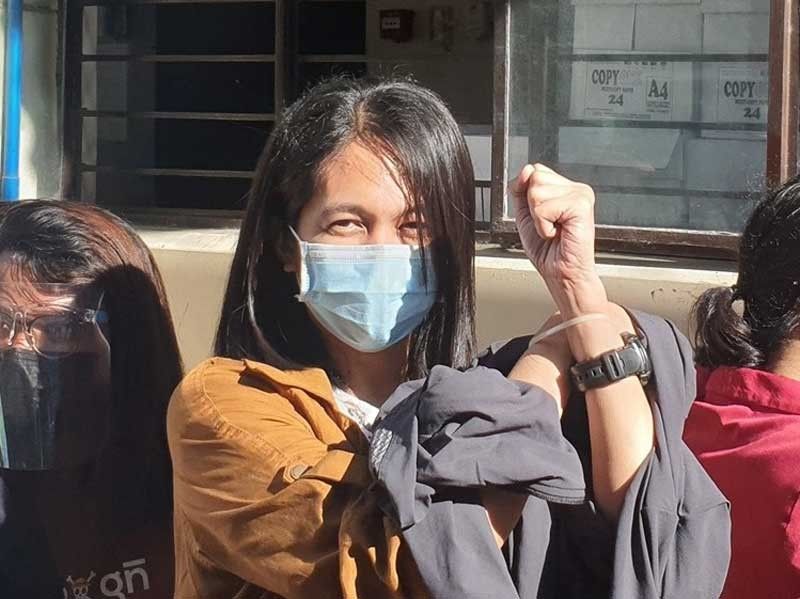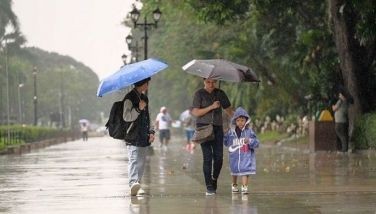CIDG: Cops 'followed rules' in Human Rights Day arrests

MANILA, Philippines — The national police on Monday asserted that the arrests of six trade unionists and a journalist on Human Rights Day on December 10 was legal and followed proper procedure.
At a press briefing on Monday morning, Police Maj. Gen. Joel Coronel, director of the Criminal Investigation and Detection Group of the Philippine National Police, backed the search and seizure operations amid backlash from rights groups who cast doubt on the charges of illegal possession of firearms and explosives.
READ: Arrests mar commemoration of International Human Rights Day
The arrests, police said were part of "Oplan Paglalansag Omega", its campaign against private armies and loose firearms.
"During the conduct of the search warrants, the operations, apart from having valid search warrants issued by a competent regional trial court, were witnessed by independent and third-party witnesses coming from the local government office and barangay officials to ensure that the police operating units were complying with operational procedures and that no human rights and individual rights had been violated in the conduct of the operations," Coronel said.
"They are presently under detention...I understand no bail had been recommended by the prosecutor's office and they will be facing criminal charges upon arraignment in the different courts," he added.
In a brief interview with alternative media network AlterMidya, detained journalist Lady Ann Salem said she and labor organizer Rodrigo Esparago were made to look away while evidence against them were supposedly planted.
WATCH: "Isang oras kami nakatalikod habang tinatanim ang ebidensya". Journalist Lady Ann Salem speaks to reporters after her inquest proceeding at the Mandaluyong RTC. pic.twitter.com/8xcxVHSCWh
— AlterMidya (@altermidya) December 11, 2020
Rights groups, including Karapatan, and the National Union of Peoples' Lawyers have pointed out that the warrants that led to the arrests were issued by Quezon City Regional Trial Court Executive Judge Cecilyn Burgos-Villavert—the same judge who signed warrants that led to the arrests of 58 activists in 2019, among them Reina Mae Casino.
The CIDG also presented its recap of "evidence" recovered which includes two explosives, four short firearms, four external hard drives and, Coronel said, "assorted laptops, notes, and paraphernalia."
What do the PNP's rules say?
Among those arrested on Thursday were:
- Trade union organizer Denisse Velasco
- Editor and journalist Lady Ann Salem
- Labor organizer Mark Ryan Cruz
- Labor organizer Romina Astudillo
- Labor organizer Jaymie Gregorio
- Labor organizer Joel Demate
- Labor organizer Rodrigo Esparago
Supporters of the seven say that the weapons were planted.
Rule 14 of the PNP's Revised Operational Procedures rule book says that among the properties which may be the objects of a search warrant are "objects including weapons, equipment, and other items used or intended to be used as the means of committing an offense."
Rule 14.6 also reads:
Houses, rooms, or other premises shall not be searched except in the presence of the lawful occupant thereof or any member of his family or, in the absence of the latter, in the presence of two (2) witnesses of sufficient age and discretion residing in the same locality.
"The warrant should be served during daytime unless there is a provision in the warrant allowing service at any time of the day or night," it also reads, though the CIDG's presentation of the operations shows that the searches were carried out at 2 a.m. on December 10.
Police Gen. Debold Sinas, the chief of the Philippine National Police, earlier defended pre-dawn operations against National Democratic Front peace consultants Eugenia Magpantay and Agaton Topacio over similar charges, saying: "That's why it happened in early morning, so they wouldn't see us. Because imagine, if we searched in the morning, the entire neighborhood would see us. They could have a spotter or a contact, so by the time we got there, they would have escaped already."
Magpantay and Topacio, both in their late 60s and whom their son said had long retired from the underground movement, were killed on November 25 in what police said was a shootout.
READ: Rights group slams police claims of 'nanlaban' and possession of firearms
Rights groups call on PNP to address doubts
In statements over the weekend, rights monitors said the Human Rights Day arrests were questionable amid President Duterte's well-documented contempt towards activists, calling on independent authorities to probe the allegations and circumstances behind the search warrants and the searches.
The New York-based Human Rights Watch for its part pointed to the PNP's "damning history" of cops planting evidence.
"Human Rights Watch has previously documented illegal planting of evidence by police in cases of ordinary Filipinos gunned down by police in the government’s ‘drug war.’ There is also a damning history of such underhanded police actions against political activists that correctly arouse suspicions," Human Rights Watch deputy Asia director Phil Robertson said.
READ: NBI files murder, planting of evidence raps vs cops in Ragos killing
"Such arrests are cause for concern given that there were statements by families and concerned personalities alleging irregularities and errors in the said operations, including the fact that arrests were made in the midsts of red-tagging of activists and human rights workers," the Commission on Human Rights said in a statement Sunday.
In its March 2017 report on the Duterte administration's campaign against illegal drugs, HRW said "police routinely planted guns, spent ammunition, and drug packets next to the victims’ bodies," to justify their claims of self-defense in official reports.
Findings published by the United Nations Office of the High Commissioner for Human Rights have also suggested a pattern suggesting planting of evidence by police officers in the administration's flagship campaign against drugs and casting doubt on the self-defense narrative, implying that the victims were likely unarmed when they were killed.
"It would be then for the government's benefit, particularly the PNP, to address these doubts and allegations of anomalous arrests, especially that several pronouncements were already made by this administration—here and abroad—on its commitment to respect and protect the human rights of all," CHR said.
"These commitments need to be translated to actual reforms, including the effectiveness of redress mechanisms in addressing similar allegations and different human rights violations. For if these pledges will remain as words, then we would not only fail the human rights cause, but this would also render hollow the government's primary assertions that it will abide by its obligation to uphold the rights of all."
— with reports from Bella Perez-Rubio and Christian Deiparine
- Latest
- Trending

































